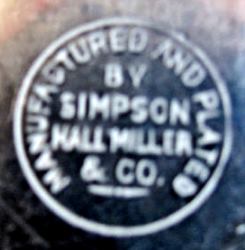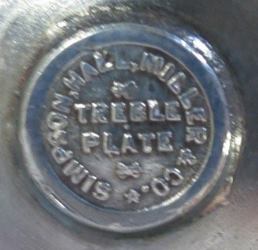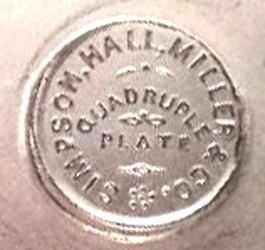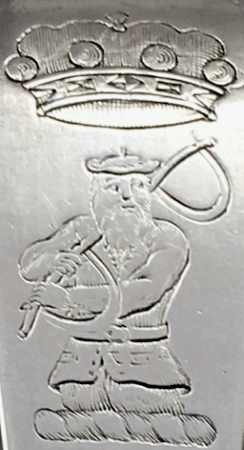YOUR GUIDE TO MARCH NEWSLETTER:
articles
new members
members' window
mail to ASCAS
replies to questions
a page per month
a silversmith per month
a word per month
a book on my shelf
a crest per month
a year per month
contributors to this Newsletter
search engine
disclaimer and privacy policy
Bill Jackman presents:
Silver sailing ships


Literature about this subject matter is scarce and few written material is available to support collectors in their research.
The author has a collection of 35 ships gathered in three years of research.
Usually silver models of boats are very accurate in design and although there is no shortage of them the better ones are hard to find and can be expensive.
Early Chinese boats are much sought after, especially those fitted with cannons. Some of them are no more than 50mm long.
As many examples are unmarked, the collector can't know where the boat was made or who made it.
The first silver ships were called nef. They were a dinner-table ornamental or utilitarian article in the form of a model of a ship, with masts, sails, rigging and with various figures on board.
The ancient examples (13th-16th centuries) were drinking cups. The later were receptacles for dining implements.
Such pieces were used in France, Germany, Spain and Italy but most of the extant nefs were made in Germany at the end of the 19th century.
There is disagreement about nef's use. Someone believe that they began as incense boat of the church, other believe they were an ancestor of brass and silver "Burgundy waggons" or a drinking vessel as noted in 13th century French romances.
The nef was an important part of Continental elegant dining, bearing in its hollow hull the spoon, knife, napkin, spices of the host....
click here

Welcome to new ASCAS members:
Yosef Immanuel - Israel
Pierre Saric - France
Jerry Sun - USA
Donna Meyer writes:
...I have recently acquired a set of open cauldron salt cellars along with spoons, initialled W on each and am not sure if I am identifying them correctly.
Spoons: Marked with a full body lion and the initials T.C. I believe this means that they are definitely sterling silver and made in the town of Birmingham and that the maker was Theodore Cohn.
Salt Cellars: Marked G.R for I believe George John Richards a British Silversmith.
Again has the same full body lion so I assume the same as above. Then there is a female head facing to the left not 100% sure about this?
There a mark that is very worn off but I think it is a leopards head for the London Assay Office?
There is a letter which I know would provide me with the date but I can't figure out what letter this is?
Is there any help you can be, I attached photos?
If you can, thank you sooooo much in advance!
Donna Meyer
The marks are rubbed and not well readable. Anyway the salts are hallmarked London 1846 maker George John Richards (see http://www.silvercollection.it/ENGLISHSILVERMARKSXGDUE2.html ).
The spoons' maker is (possibly) Thomas Chawner, active c.1772-1786
Giorgio Busetto
In this column we presents a page obtained from makers'
brochures, books, auction catalogs, advertising or whatever
other printed paper, related to silver, that may be of interest
for ASCAS members.
The images will be published at a "low resolution" level and for
private and personal use only.
This column is published under the kind permission of Giorgio
Busetto's website
OTHER SILVER ADVERTISEMENTS

This month ASCAS presents an old trade advertising card issued by The Imperial Tobacco Co for Great Britain and Ireland Ltd.
HALL-MARKS ON SILVER TRADE CARD
An early 20th century trade card advertising Wills's cigarettes of W.D & H.O Wills, Bristol and London.
The trade card bears on the front the image of a British silver hallmark and on the back the descriptive illustration of British hallmarking system.
Its measures are 6.5 cm. x 3.5 cm. (2 5/8" x 1 3/8")
In this column we present an abstract from a page of the "What is? Silver Dictionary"
courtesy of


STORK CLAMP
(UMBILICAL CORD SCISSORS)
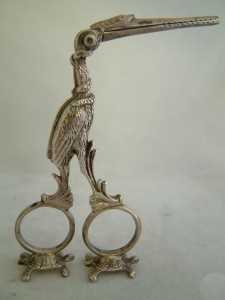
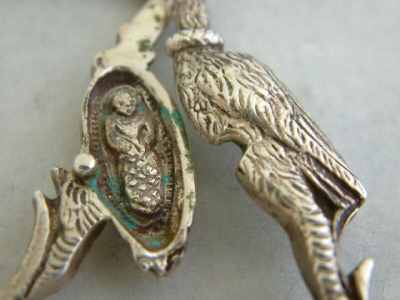
An unusual item in the scissors shape of a stork, commonly described as "umbilical cord scissors".
Sometimes the finger rings have a support (often a pair of turtles, symbol of longevity) to keep scissors straight on.
When the scissors are opened, a baby in swaddling clothes can be seen in the body cavity.
Uncertain is the effective use of this item and various hypotheses have been formulated.... MORE...
In this column
we present marks, information and history of silversmiths and
silver manufacturers.
This column is published under the kind permission of Giorgio
Busetto's website

SIMPSON, HALL, MILLER & CO
The firm was organized by Samuel Simpson in 1866. In 1878 Simpson made an agreement with William Rogers Jr to supervise the manufacture and marketing of Simpson, Hall, Miller & Co Rogers "Eagle" brand.
The "Eagle" was a brief duration business (1862 - c. 1865) managed by William Henry Rogers (often identified as William Rogers Jr, he died in 1896) after the retirement of his father in 1861...
MORE...
In this column we
present images and descriptions of Crests and Mottoes of British,
Irish and Scottish families as engraved on silver items.
This column is published under the kind permission of Giorgio
Busetto's website

FAMILY CRESTS: LIST OF NAMES
ILLUSTRATED DIRECTORY OF FAMILY CRESTS
HAY
This crest is on a silver spoon from London 1711-12 by David Willaume I, the famous Huguenot silversmith.
The engraved crest is a half image of a man with a beard and a Scottish cap holding an ox yoke over his right shoulder the crest of the Hay family in Balhousie or Leys Scotland.
It might have belonged to John Hay, 2nd Marquess of Tweeddale (1645 - 20 April 1713) who was a representative peer after the union of England and Scotland in 1707. Which would explain the crown which is either a baron's or that of a lord of Parliament in the Scots peerage, and a Scottish Crest on a piece of London silver.
Maurice Meslans


DISCLAIMER AND PRIVACY POLICY
ASCAS is a community of people having a common
interest in antique silver.
It is a non-profit association without commercial links.
Membership is open to whomever has a true interest in
this subject matter.
ASCAS has no real property and no fees are requested nor
accepted from members.
ASCAS keeps in touch with its members only through
periodical newsletters, e-mails and web-site updating
and ignores and is not responsible for any other
activity pursued by its members.
Likewise, ASCAS is not responsible for opinions,
evaluation and images displayed, and in any form
published or supplied for publication, by its members
who, in any case, maintain the property of their works
and assure the respect of national and international
legislation about Intellectual Property.
ASCAS does not have the full addresses of its members (only
town, country and e-mail address are requested for
membership).
ASCAS handles and protects with care its members' e-mail
addresses, will not disclose the addresses to third
parties, will use this information only to reply to
requests received from members and for communications
strictly related to its activity.
These rules are expressly accepted by submitting the
membership request.
|
|
















